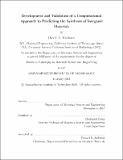Development and validation of a computational approach to predicting the synthesis of inorganic materials
Author(s)
Kitchaev, Daniil A
DownloadFull printable version (34.95Mb)
Other Contributors
Massachusetts Institute of Technology. Department of Materials Science and Engineering.
Advisor
Gerbrand Ceder.
Terms of use
Metadata
Show full item recordAbstract
The concept of computational materials design envisions the identification of chemistries and structures with desirable properties through first-principles calculations, and the downselection of these candidates to those experimentally accessible using available synthesis methods. While first-principles property screening has become routine, the present lack of a robust method for the identification of synthetically accessible materials is an obstacle to true materials design. In this thesis, I develop a general approach for evaluating synthesizeability, and where possible, identifying synthesis routes towards the realization of target materials. This approach is based on a quasi- thermodynamic analysis of synthesis methods, relying on the assumption that phase selection is guided by transient thermodynamic stability under the conditions relevant to phase formation. By selecting the thermodynamic handles relevant to a growth procedure and evaluating the evolution of thermodynamic boundary conditions throughout the reaction, I identify potential metastable end-products as the set of ground state phases stabilized at various stages of the synthesis. To validate this approach, I derive the quasi-thermodynamic influence of adsorption-controlled finite- size stability and bulk off-stoichiometry on phase selection in the aqueous synthesis of polymorphic FeS2 and MnO2 systems, rationalizing the results of a range of synthesis experiments. To enable this analysis, I develop and benchmark the methodology necessary for the reliable first-principles evaluation of structure-sensitive bulk and interfacial stability in aqueous media. Finally, I describe a manganese oxide oxygen evolution catalyst, whose high activity is controlled by metastable, tetrahedrally- coordinated Mn3+ ions as an example of materials functionality enabled by structural metastability. The framework for the first-principles analysis of synthesis proposed and validated in this thesis lays the groundwork for the development of computational synthesis prediction and holds the potential to greatly accelerate the design and realization of new functional materials.
Description
Thesis: Ph. D., Massachusetts Institute of Technology, Department of Materials Science and Engineering, 2018. This electronic version was submitted by the student author. The certified thesis is available in the Institute Archives and Special Collections. Cataloged from student-submitted PDF version of thesis. Includes bibliographical references (pages 159-191).
Date issued
2018Department
Massachusetts Institute of Technology. Department of Materials Science and EngineeringPublisher
Massachusetts Institute of Technology
Keywords
Materials Science and Engineering.